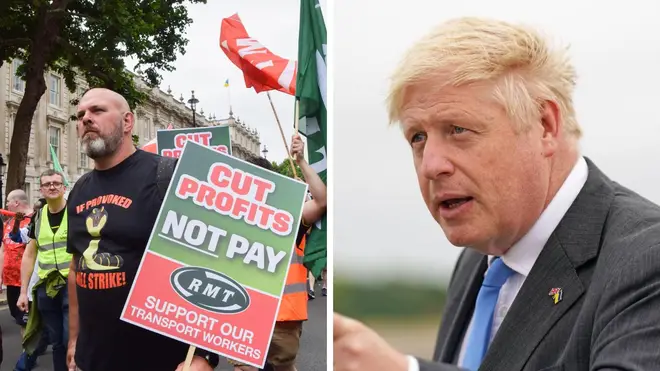
Iain Dale 10am - 12pm
21 June 2022, 09:58 | Updated: 21 June 2022, 11:04

Boris Johnson has warned rail passengers must be prepared to "stay the course" despite "unnecessary aggravation" of the biggest rail strike in 30 years.
The Prime Minister told a meeting of the Cabinet on Tuesday the RMT strike was causing "significant disruption and inconvenience up and down the country".
They were making it "more difficult for people to get to work, risking people's appointments, making it more difficult for kids to sit exams - all sorts of unnecessary aggravations".
He set out why he believed the strikes were "so wrong and so unnecessary", pointing to the levels of support offered to the industry during the pandemic and the "colossal" investment in rail infrastructure.
"We believe in our railways, we believe in our railway infrastructure as a vital part of levelling up across the country," he said.
Only a fifth of trains are running on Tuesday and half of lines are closed as around 40,000 members of the Rail, Maritime and Transport (RMT) union at Network Rail and 13 train operators have walked out.
Read more: UK grinds to a halt as biggest rail strikes in 30 years begin
Read more: Tory MP calls RMT General Secretary Mick Lynch a 'marxist' and 'waste of space'

Railway stations across the UK deserted as strike action begins
Services are generally restricted to main lines, but even those are only open between 7.30am and 6.30pm.
Mr Johnson said it is clear reforms are needed on the railways.
"We need the union barons to sit down with Network Rail and the train companies and get on with it," he said.
"We need, I'm afraid, everybody, and I say this to the country as a whole, we need to get ready to stay the course.
"To stay the course, because these reforms, these improvements in the way we run our railways are in the interests of the travelling public, they will help to cut costs for farepayers up and down the country."
But the modernisation programme was also in the interests of workers because "if we don't do this, these great companies, this great industry, will face further financial pressure, it will go bust and the result will be they have to hike up the cost of tickets still further".
That would result in the "disaster" of declining rail use, he warned.
This story is being updated, more follows...